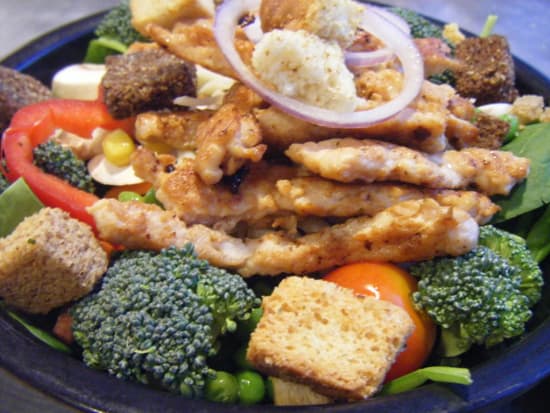Today there’s a chill in the air so intense that I sadly realize I can no longer just throw on my favorite pair of UNH flip flops. As an unprepared college student, I have two other choices: high heels or fur-lined rain boots. Regardless of the lack of rain, I choose the rain boots, bundle up with a jacket, hat, and scarf, and shuffle down the street to the dining hall. Expecting to get several stares, as I am well-equipped for moisture on this dry fall day, I want to sit down and interview someone as soon as possible—to reduce the exposure time of my ridiculous footwear. As I scoured through the crowds, I ran into my good friend Daniel—a fellow nutrition student who I was excited to see. We decided to catch up over lunch and he was also enthusiastic about being a part of my next Guiding Stars investigation.
And so, with my boots comfortably hidden under the table, Daniel began telling me all the juice about his nutritious college life. Daniel likes to concisely define nutrition as “the science of what your body does with food.” He is a senior nutrition major here at UNH—“a nutrition and wellness major to be exact,” he pointed out. Nutrition and wellness students focus mainly on nutrition as disease prevention rather than as the treatment of disease.
On top of his schoolwork, Daniel is also an important part of the UNH chapter of Slow Food USA. Slow Food USA is a global organization that connects the pleasure of eating good food to a commitment to the environment and community. As co-president of the UNH chapter, Daniel has had several opportunities to learn more about food and issues relating food that go beyond just nutrition—like social and environmental issues. This semester, Slow Food UNH has been active in organizing demonstrations like making homemade apple sauce and pumpkin bread. They plan to coordinate field trips and debates about sustainability and fair trade in the future.
This slow foodie finds himself at the dining halls a few times a week. He describes his trips to the dining hall as “fun” because of the variety of options and the social scene. The Guiding Stars ratings really stick out to him, especially because he is already so nutrition- conscious. He once got the opportunity to learn about how the food is rated when two Guiding Stars representatives paid a visit to his food science class last year. He believes the ratings are mostly useful for those who don’t have much background on food.
With a smirk, Daniel admitted that his favorite food is chicken fingers—not a predictable favorite for a nutrition major, but hey – we have to let loose sometimes, too. I offered Daniel a filling way to enjoy his chicken nuggets, rather than paired with the usual side of ketchup and fries. We topped his favorite salad combination with a couple tasty chicken fingers—it was very tasty. This is a great way to fill up on fewer calories and fat while still enjoying a treat.

When Daniel graduates this spring, he doesn’t plan to enter the workforce quite yet—he hopes to continue his education by going to graduate school at Northeastern University. There, he plans to focus on studying obesity and eating disorders or applied nutrition. This slow foodie is really going places with nutrition—but he’s never going to leave those chicken fingers behind.
About our Student Blogger
Sarah Frederickson is a senior Nutrition & Wellness major at the University of New Hampshire (UNH). She has a strong passion for promoting healthy eating and overall wellness. With some help from the UNH dietitian, Sarah recently finished a project called Creative Eating which is an approach to educating students on making interesting, delicious, and smart choices in the dining halls.
Along with a personal blog that she uses to support this project, Sarah has a Facebook group where Creative Eating enthusiasts can stay updated with project events, news, and recipe ideas. She is also an active member of Students Promoting Information on Nutrition (SPIN), a UNH student organization meant to spread nutrition knowledge to students through peer education.